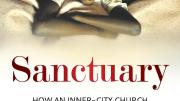Christa Kuljian ’84 traveled just a few miles from home, in Lexington, Massachusetts, to Harvard. Her next step was longer: to South Africa, where she worked in a school, and, after more studies and a few other stops, where she ran a social-service foundation’s office for more than a decade, as the country became a democracy—and her permanent home. She is now a writer. Her first book, Sanctuary: How an Inner-City Church Spilled onto a Sidewalk (Jacana, and via https://www.sanctuary-book.co.za), details what happened when refugees from oppression in Zimbabwe were given shelter in a prominent church. From the prologue, set in May 2008, as xenophobic violence swept South Africa:
A chance remark by a police officer—“Zulus are attacking all the foreigners”—overheard by one man, was all it took. By 9 p.m. over a thousand men had assembled on Pritchard Street outside the Central Methodist Church in downtown Johannesburg.…The men wore jackets and jerseys and stamped their feet against the cold. In their hands they grasped their weapons tightly. The weapons were unconventional, hastily gathered. Mostly they consisted of wooden planks that had been forcefully pulled off the pews of the chapel inside the church, and metal bars that had been wrenched from stairway railings. Desperation and fear, and the memory of another terrifying time just a few months before, had prompted these men to act, and they had pulled the church apart…to defend themselves. Some held the odd brick in their hands, or the leg of a stool, but they stood ready and waiting, shoulder to shoulder.…
Word spread on the street that the Bishop [Paul Verryn, who had led the church since 1997] was calling for everyone to move inside. Gradually, reluctantly, the men followed him into the building and into the sanctuary, the large main room of worship in the church. Verryn stood in the pulpit and looked out across the restless crowd. He saw their anger. He saw their fear. Then, slowly and calmly, he spoke.
“Do you think that you would have any chance, with your sticks? Do you think that your sticks would defend you against guns? We don’t want to start a war. You must bring all of your weapons up to the front and drop them here.”
Silence. Verryn waited. No one moved.
Then two men came forward and dropped their metal poles in front of the pulpit. The gathering shifted uneasily and a low murmuring went around the room. Verryn saw their hesitation, but he continued to stand in front of them, waiting, not speaking. Then another man walked forward and dropped his wooden stick. Slowly, a motley pile of weaponry began to form.…The battle never happened. The bloodbath was averted. Central Methodist settled back into an uneasy sleep.









